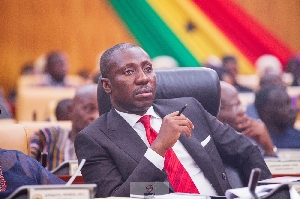
Afenyo Markin
Alexander Afenyo-Markin, the Minority Leader in Ghana’s Parliament, has come under intense scrutiny following his recent proposal for a dedicated hospital for Members of Parliament (MPs) and a new parliamentary chamber. This suggestion, made during the inauguration of the Parliamentary Service Board on March 17, 2025, has stirred significant controversy among Ghanaians.
During his speech, Afenyo-Markin emphasized the unique challenges that parliamentarians face in accessing healthcare. He argued that a hospital specifically for MPs would help protect their health and privacy. “We are a political class, and our health issues must be known within certain confines,” he stated. He pointed out that many lawmakers travel abroad for medical treatment due to confidentiality concerns, suggesting that a dedicated facility could alleviate this issue.
However, his proposal has sparked outrage on social media, with many critics questioning the appropriateness of such a project, especially given the current economic challenges in the country. As Ghana grapples with significant debt and a recovering economy, the idea of spending public funds on a hospital exclusively for MPs has been met with disbelief and anger. Critics argue that resources should be directed toward improving existing healthcare facilities rather than creating a new one for legislators.
Many Ghanaians have taken to platforms like X to express their dissatisfaction. Comments highlight a sense of elitism, with some users accusing Afenyo-Markin of fostering a divide between the political class and ordinary citizens. One user remarked, “Why does Afenyo-Markin keep using the term ‘political class’ and feel like they deserve superior treatment?” Such sentiments reflect a growing concern that the political elite are increasingly disconnected from the realities faced by everyday Ghanaians.
Moreover, some have pointed to previous government expenditures, questioning the rationale behind proposing new facilities when existing ones are underfunded. The backlash suggests a broader frustration with politicians perceived as prioritizing their comfort over the needs of the public.






